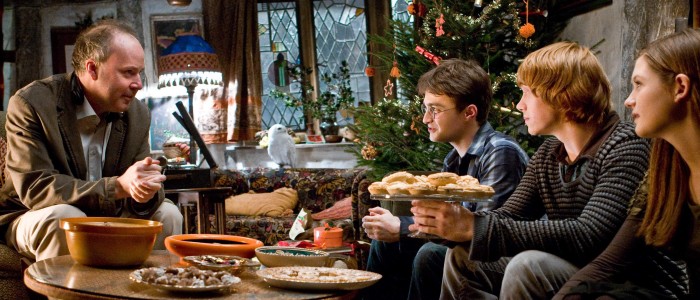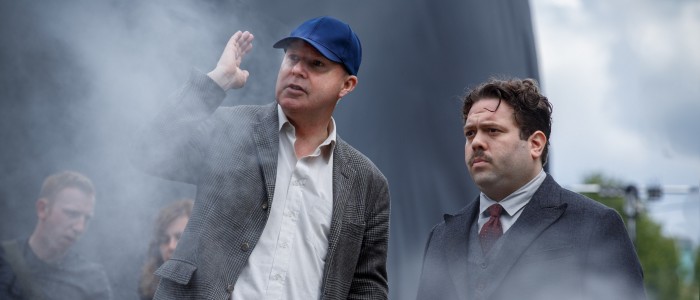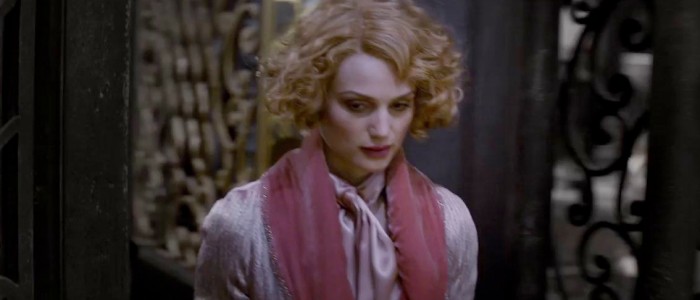Interview: 'Fantastic Beasts' Director David Yates On Returning To The Potterverse
Director David Yates is already intimately familiar with the Harry Potter cinematic universe, having helmed four of the eight movies. But Fantastic Beasts and Where to Find Them offered him a chance to do something a little different within that universe — namely, design a whole new corner of that universe from the ground up. During a recent press day in New York, he spoke with /Film about his hesitation (or rather, lack thereof) to return to the Potterverse, his plans for the sequel, and the deleted Fantastic Beasts scenes we didn't see in the theatrical cut. Read our full David Yates interview below.
So you directed four Harry Potter movies, and now you're back doing a spinoff. Was there any reluctance on your part to return?
Once I read the script, none at all. None at all. Because I was so excited. I mean, three things. One, the script was really delightful, even in its first draft. Two, I would have the opportunity of working directly with Jo [Rowling], and that was really exciting. With the movies, the Potter movies, we adapted the books, as you know. So Jo was always away writing the other books, and so we never really go to work with her directly. And three, I as a director, I got the chance to set the table. You know, cast the movie, build the world from the ground up, something I never had the chance to do on completely on Potter.
Yeah, because you came in halfway through.
The party was halfway through and you kind of, it's already there. And by the way, it was fantastic already. Chris Columbus did a brilliant job in setting up all that. So it was a no-brainer. Why would you turn that down?
How early in the process did you come in on this one?
Quite early. I was there, we got the script, and then I developed the script for about a year with Jo. Steve Kloves also worked on it.
 What were the advantages and disadvantages of the fact that you didn't have a book to work off of? Did that make it more or less challenging?
What were the advantages and disadvantages of the fact that you didn't have a book to work off of? Did that make it more or less challenging?
Oh, that's much more helpful. Because with the books, everyone has a proprietary relationship with them. They know the story intimately, they're passionate about the story and the characters, and they come into the movie theater expecting to see the movie they see in their heads. Quite rightly. People already have a sort of sense of what it should be, and everybody has a different sense of what the movie should be. So everyone is sitting at that movie theater who loves the books, already has a movie specifically that they love, centering on one character that they love. In this case, they don't have that. They kind of have to experience the story for the first time with a group of other people in the dark of the theater. So for me, and for the rest of us, it's a great pleasure. Because you're actually telling the story for the very first time. And you know, people will experience it in that theater rather than buy the book. And I think it's a natural extension in some ways.
Jo's books were amazing in the way they ignited this social phenomena. People joined together to share what they loved about her characters. It feels fitting that as she develops the story, as she moves them forward, as she takes the universe wider, that she chooses to channel that into the theater. Which is a very social place to experience her stories. You're sat in the theater with lots of people you'll never meet, but you're laughing or you're crying or you're jumping out of your seat together. You're experiencing it together.
But at the same time, did you have any anxiety about going back to this world that people already, as you said, have so much invested in?
There was before I read the script. Because before I read the script, I thought, oh my gosh, is it going to be set at Hogwarts? Is it going to go back? Is it going to be... But the script, 1926 New York, new characters, a new set of themes, it didn't feel like a retread. It didn't feel like... you know, I remember, Steve Kloves said to me last week, he said, you know, when we first announced we were going to do Beasts, he remembered some newspaper reports and they were kind of cynical, it was like, oh, here they go. They're just gonna milk this thing. But what those people who are writing those reports hadn't seen was the screenplay. Which felt really fresh and really different to everything we've done before.
I think ultimately, Jo wouldn't have rehashed. She's got too profound and dynamic an imagination to ever kind of just go back and do what she'd done before. For Jo, it had to be fulfilling for her. For Jo, it's not about money or exploiting what she's done. She said, I don't need money. I don't need that. I'm not interested in that. I need to be stimulated, I need to be excited about what I'm doing. She needs to be really thrilled about bringing this story to the world. That's what makes her write them. Not the inducement of more of the same. And that, for all of us when we read that script, it was like, wow, this feels different. In a weird way, it's still got the values of what she created originally.
 You're already set to return for the sequel, right? In Paris, I heard?
You're already set to return for the sequel, right? In Paris, I heard?
Yes, we're prepping it. Yes. Yes.
Does it still take place in 1926 or does more time pass?
A little bit of time. Two years later. A year or two later, I should say, a year later.
So why decide to move it from New York to Paris?
Grindelwald is from Europe and it feels natural to take it to — and we've never been to Europe before. And Paris thematically, the second movie has a kind of romantic element about it. And if you're gonna have a romantic element, it seems absolutely right to set a movie in Paris. So that's one of the reasons.
Are we going to see these storylines converge with actual history from that period?
It's too early to tell. I know Jo's got it arc-ed out, and I know history is... She's kind of, you know, the cycle of history and what happened up to and including the Second World War is, there's I think there's a possibility of going in that direction. But it's really early to tell. I can't really be too specific.
Okay, fair enough. When you're watching the film, how much did current social or political issues inform this film? When you make a movie about an attack in New York, it's impossible in this day and age not to think of 9/11. How much did you take that into consideration when you were putting this film together?
You are never totally able to absorb what's happening in the wider world in a small way. It sort of refracts and reflects in the storytelling. As Jo was saying about the script when we were making the movie. Sometimes you don't even do it consciously. You do it subconsciously as you're putting the story together. Because you don't make a movie in a vacuum. You're part of this fabric of society and the fabric of history in that moment. And there are things that are happening outside your immediate world that you are influenced by and affected by and inspired or connected to. So it reflects in the work.
Yeah, I know for me one of the things that really stood out was that terror alert levels thing. I was like, I've seen that. I know what that is.
Yeah. Yeah. It feels resonant.
 Last question. Can you talk a little about some of the deleted scenes we might see on the DVD?
Last question. Can you talk a little about some of the deleted scenes we might see on the DVD?
Yes. The scenes we cut out, there are two scenes, two of my favorite scenes in the whole movie that I cut out. When I watched them with Mark, we reviewed the DVD extras the other day, and I said to Mark [Day], my editor, I can't believe I've taken these out, I must be insane. But they feel right. When you see the movie, it's the right thing to do. But when you see them individually, we go, why did we take that out?
One is Jacob coming home from the bank and he's been refused the loan and Mildred, his girlfriend, is waiting for him. She runs up in the street to see him and she says, did you get the loan? And he says, no I didn't get the loan. And she takes her ring off and gives it back to him. And she says, I thought you were getting a bakery and leaves him. It's a really heartbreaking scene and Dan [Fogler]'s beautiful in it.
There's another scene where Alison [Sudol] and Katherine [Waterston], in the case, sing the Ilvermorny song, the school song. I asked Alison would she write it, and she wrote this beautiful Ilvermorny school song. And they sing it together and the two boys, Jacob and Newt, they sit there and they watch. And as the girls perform this song, this ode to Ilvermorny, they slowly fall in love. They're both beautiful scenes, but in the movie and in the momentum of the movie they didn't quite work. So those two. And there's more.
***
Fantastic Beasts and Where to Find Them is in theaters now.
